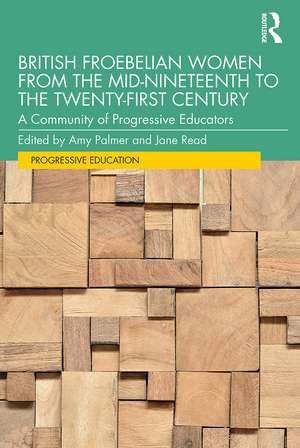British Froebelian Women from the Mid-Nineteenth to the Twenty-First Century: A Community of Progressive Educators: Progressive Education
Editat de Amy Palmer, Jane Readen Limba Engleză Paperback – 29 apr 2022
The book examines the beliefs and values of its subjects, offering crucial insights into how these women forged their professional identities and practice as new thinking about education and childhood emerged, and considers the differing forms of inspiration they drew from their connections with the Froebelian community.
This book will be of great interest for postgraduate students and academics in the fields of Women's Studies, History of Education, Early Childhood Education and Early Childhood Studies.
| Toate formatele și edițiile | Preț | Express |
|---|---|---|
| Paperback (1) | 251.19 lei 43-57 zile | |
| Taylor & Francis – 29 apr 2022 | 251.19 lei 43-57 zile | |
| Hardback (1) | 1001.07 lei 43-57 zile | |
| Taylor & Francis – 10 iul 2020 | 1001.07 lei 43-57 zile |
Preț: 251.19 lei
Preț vechi: 302.60 lei
-17% Nou
Puncte Express: 377
Preț estimativ în valută:
48.07€ • 50.31$ • 40.01£
48.07€ • 50.31$ • 40.01£
Carte tipărită la comandă
Livrare economică 31 martie-14 aprilie
Preluare comenzi: 021 569.72.76
Specificații
ISBN-13: 9780367524104
ISBN-10: 0367524104
Pagini: 222
Ilustrații: 20
Dimensiuni: 156 x 234 x 17 mm
Greutate: 0.33 kg
Ediția:1
Editura: Taylor & Francis
Colecția Routledge
Seria Progressive Education
Locul publicării:Oxford, United Kingdom
ISBN-10: 0367524104
Pagini: 222
Ilustrații: 20
Dimensiuni: 156 x 234 x 17 mm
Greutate: 0.33 kg
Ediția:1
Editura: Taylor & Francis
Colecția Routledge
Seria Progressive Education
Locul publicării:Oxford, United Kingdom
Public țintă
PostgraduateCuprins
List of figures. List of contributors. Series editor introduction by Catherine Burke and Jane Martin. Foreword by Amy Palmer and Jane Read. Acknowledgements. Introduction. Identity and community, revision and dissemination: the evolving Froebel community in Britain. 1. Esther E. Lawrence (1862-1944). Defining and Redefining Froebelian Pedagogy at the Froebel Educational Institute, London. 2. Clara Grant (1867-1949). Implementing Froebelian Pedagogy in an East London Slum. 3.Grace Owen (1873-1965). Sharing and Fostering Froebelian Principles within the Nursery School Movement. 4. Jeanie P. Slight (1890–1973). Disseminating Revisionist Froebelian Pedagogy. 5. Enid Blyton (1897-1968). Articulating Froebelian Pedagogy through Literature for Children and Teachers. 6. Molly Brearley (1905-1994). Educating Teachers and Popularising Developmental Approaches in the Post-War Era. 7. Elinor Goldschmied (1910-2009). Pioneering Practice for People Under Three and Those Who Care for Them. 8. Chris Athey (1924 - 2011). Integrating Piagetian Principles into Froebelian Pedagogy. 9. Tina Bruce (b.1947). Advocating and Practising Froebelian Principles. Conclusion. Froebelian pedagogy yesterday, today and tomorrow. Appendix: timeline. Index.
Notă biografică
Amy Palmer is Senior Lecturer in Early Childhood Studies at the University of Roehampton, London, UK, and Books Editor of History of Education.
Jane Read is Emeritus Fellow at the University of Roehampton, London, UK, and a member of the Early Childhood Research Centre.
Jane Read is Emeritus Fellow at the University of Roehampton, London, UK, and a member of the Early Childhood Research Centre.
Recenzii
"This book, which provides an account of how a progressive and childcentred pedagogical tradition developed and advanced in England will be of interest to students and professionals working in early childhood education and care. It also has relevance for those interested in the notion of professional identity and how this develops in the context of communities of practice."
- Rebecca Aberton, Educational Review
- Rebecca Aberton, Educational Review
Descriere
This book presents a series of critical case studies of individual women who worked and advocated for the cause of Froebelian and progressive pedagogy in Britain from the mid-nineteenth century until the present day. The book presents a picture of how women have contributed to educational life and child-centred practices.




